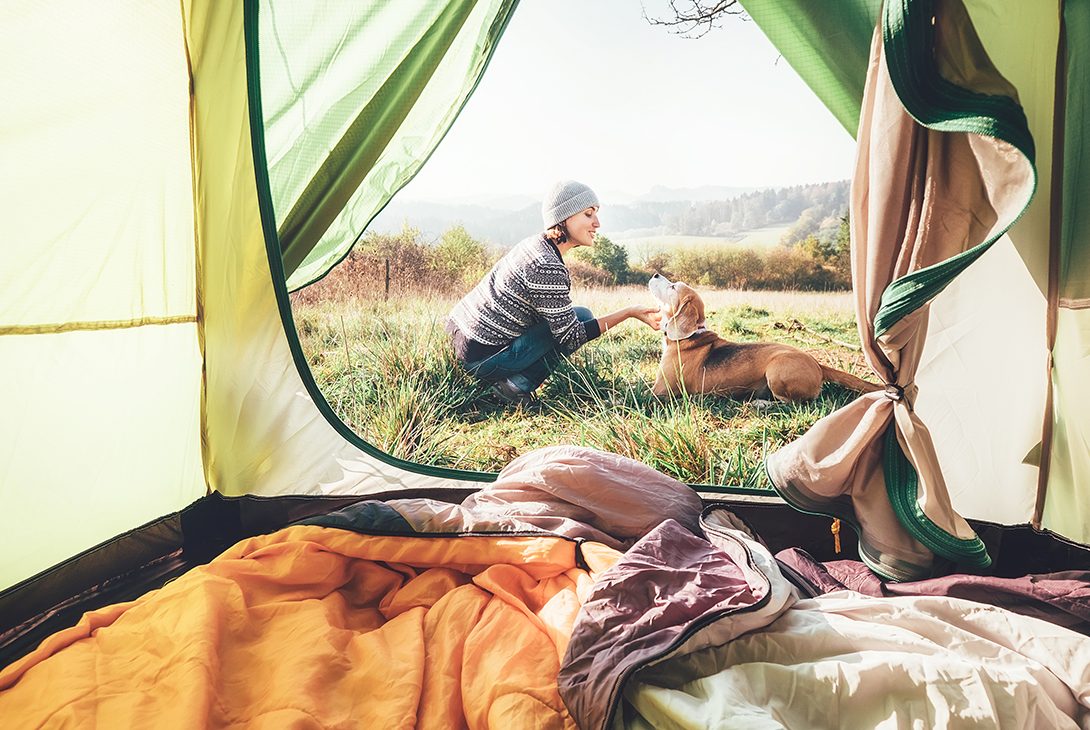
Thinking of Going Camping? With a little planning, your dog can go too!
As pet lovers start to move about the country, no doubt we will all be taking our dogs with us, right? Domestic travel has never looked so good, especially with our furry companions by our side. Here, I share with you some tips to enjoy camping with your dog.
- Check the local, state and national park rules before embarking on your journey. While most national parks are off-limits to dogs to protect the fragile wildlife, some campsites on the outer skirts of parks can be pet friendly.
- If travelling interstate, check the regulations for restraint in the car whilst travelling as some states require harnesses and seat belts at all times.
- Make sure your dog’s health is the best it can be. You will likely be a long way from your regular vet so it’s a good idea to get a check-up before you leave.

- Make sure your dog’s preventatives are up to date. Even in winter on the east coast paralysis ticks are about. Camping in nature means more wildlife, these harmlessly carry the deadly paralysis ticks that will then attach your pet.
- Update your pet’s microchip details with both your vet and the national register.
- Trim your dog’s fur if long, especially between the paw pads. Camping means extra burrs and leaf litter getting caught in the fur, so to make these things easily identifiable, keep the fur short.
- Check your pet ’s fur every day whilst on your camp trip. Pack the Dr Zoo bamboo brush to easily remove anything that attaches itself to the coat.
- If you’re planning on hiking or doing day trips, plan ahead and take your dog! Do not leave them tied up at the campsite or the car. This is an adventure for everyone and the only one who will be having more fun on the trails or beaches than you, is your dog.
- Pack extra food and water bowls in air-tight containers. Include a collapsible water bowl or bottle to take with you on walks. Hopefully, your dog is on mainly a dry food diet as it will be easier to store and keep at the campsite.

- Only bring food out at mealtimes and do not leave it out overnight. This will encourage the native wildlife to come and pick at it and potentially cause sleepless nights for everybody and sickness in our precious native species.
- Make sure your dog is kept on a lead at the campsite. This will limit their interaction with other animals, potential dog fights plus protect our wildlife. Update that lead if needed!
- Leave no trace. Pack plenty of waste bags and ensure you pick up after your dog. There are some great biodegradable doggy poop bags on the market now.
- Ensure your dog is protected during the warmth of the day and the cool of the night. Pack their favourite blanket or if heading down south get them a jacket for the night time.
- Make sure your dog is in the tent with you when you are sleeping. If they are unsettled in the sleeping compartment then encourage them into the vestibule at the front of most tents where they have more space. In saying that, ensure your tent is big enough to accommodate everyone. If you have a small dog, this is where crate training prior can be of huge benefit as your pet feels comfortable in their little den space.

- Don’t forget the first aid kit and closest vet’s number! Just in case. Remember to pack the Dr Zoo suncream and mozzie repellent too.
- Don’t try and train your dog on the camping trip, do it in advance. Barking can be disturbing to other campers and if your pet is distressed in an unfamiliar environment, these behaviours can worsen. Refresh on all your commands well in advance.
- Invest in a reflective collar. Your dog will be easily spotted if he does get away from the lead.
- Try a few day trips first and see how your dog goes in that environment. Be true to yourself about their personality and plan accordingly.
- Prepare your dog for longer car rides and talk to your vet about options for car sickness.
- Have fun and explore this beautiful country!
Xo Dogtor Andy